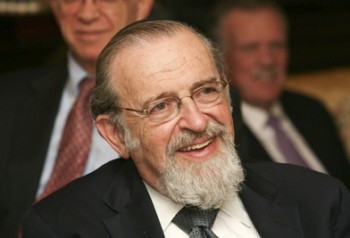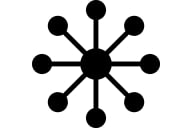You have /5 articles left.
Sign up for a free account or log in.

Rabbi Norman Lamm
Yeshiva University
Rabbi Norman Lamm, widely credited for much of the growth and success at Yeshiva University in the last 50 years, announced his retirement Monday, with an apology for mishandling sexual abuse allegations made by boys against a principal and a teacher at the university's high school in the 1970s and 1980s.
Lamm was president of Yeshiva at the time, and his admission late last year that he never reported the allegations to authorities has infuriated not only the victims of sex abuse, but many others with ties to the university. There have been calls for Rabbi Lamm to be fired, and Yeshiva has been compared to Pennsylvania State University for keeping quiet about the abuse of children. Lamm was president of Yeshiva from 1976 to 2003, when he became chancellor (something of a president emeritus position). But in addition to that role, he has also until now been rosh yeshiva, or head of the rabbinic college within the university.
The allegations involving abuse became public late last year in a series of articles in The Forward. The allegations stunned many at Yeshiva and in the orthodox Jewish world, where Yeshiva is viewed as a flagship institution. But Lamm's comments to The Forward reporter caused considerable outrage when he seemed to defend his decision not to notify authorities. He said that his approach was not to call the police, and he seemed concerned about the reputations of those accused.
"If it was an open-and-shut case, I just let [the staff member] go quietly. It was not our intention or position to destroy a person without further inquiry," he said. “My question was not whether to report to police but to ask the person to leave the job." He added that these incidents came "before things of this sort had attained a certain notoriety."
One of those accused of inappropriate behavior at Yeshiva was accused of similar behavior in subsequent positions he obtained in part because the university never pressed charges or went public, The Forward reported in February.
On Monday, Lamm sent a long letter to students and faculty members at Yeshiva announcing his retirement. Most of the letter dealt with successes at the university, but he also apologized for his actions when he learned of the abuse allegations, and invoked the Jewish tradition of teshuvah, or repentance.
"And it is to this I turn as I contemplate my response to allegations of abuse in the Yeshiva community," he wrote. "At the time that inappropriate actions by individuals at Yeshiva were brought to my attention, I acted in a way that I thought was correct, but which now seems ill conceived. I understand better today than I did then that sometimes, when you think you are doing good, your actions do not measure up. You think you are helping, but you are not. You submit to momentary compassion in according individuals the benefit of the doubt by not fully recognizing what is before you, and in the process you lose the Promised Land. I recognize now that when we make decisions we risk, however inadvertently, the tragedy of receiving that calamitous report: tarof toraf Yosef, 'Joseph is devoured,' all our work is in vain, all we have put into our children has the risk of being undone because of a few well intentioned, but incorrect moves."
"And when that happens -- one must do teshuvah. So, I too must do teshuvah," he wrote. "True character requires of me the courage to admit that, despite my best intentions then, I now recognize that I was wrong."
When the allegations surfaced last year, the current president of Yeshiva, Richard M. Joel, issued an apology: "The safety and well-being of our students is Yeshiva University’s highest priority. The inappropriate behavior and abuse alleged by The Forward to have taken place in the past, and described in statements attributed by The Forward to Dr. Lamm, are reprehensible.... The actions described represent heinous and inexcusable acts that are antithetical both to Torah values and to everything that Yeshiva University stands for. They have no place here, in our community, or anywhere at all. The thought that such behavior could have occurred at our boys’ high school, or anywhere at this institution, at any time in its past, is more than sufficient reason to express on behalf of the university, my deepest, most profound apology."
But on Monday, Joel offered only praise for Lamm. Joel's statement in full was the following: "I would like to express my appreciation to Rabbi Dr. Norman Lamm for his half-century of service to Yeshiva University. During his tenure he helped guide the University with steadfastness and vision. Dr. Lamm’s contributions to the Jewish world as a distinguished rabbi, philosopher and scholar are unparalleled. We wish Dr. and Mrs. Lamm health and fulfillment into the future."
Advocates for those who reported abuse at Yeshiva have repeatedly questioned why Lamm was being allowed -- after admitting he failed to notify authorities -- to hold positions of honor at the university. A blogger for The Times of Israel wrote in December: "The time is now for Rabbi Norman Lamm to be fired. No one who turns a blind eye to molesters should be permitted to remain in their job. One cannot be a rabbi, a teacher -- or a decent human being if they see or know something, and do nothing. If you see something, say something – one doesn’t need to be a Torah Scholar to know that."
Kevin Mulhearn, a lawyer who represents 22 men who say they were abused at Yeshiva's high school in the 1970s and 1980s, told The Forward Monday that Lamm's statement was "a positive first step, but only a first step," and that the entire university, not just Lamm, must "make amends."
Added Mulhearn: "As an attorney representing 22 men who were sexually and physically assaulted by YUHS administrators and teachers, I can state categorically that YU’s cold, callous, and calculating indifference and inaction to sexual assaults at [Yeshiva University High School] created a deep reservoir of pain."








